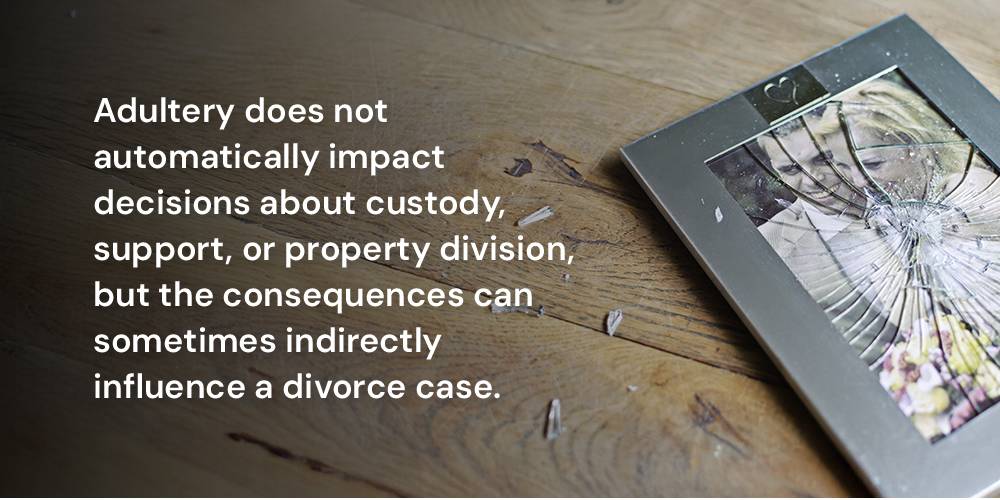Can I Sue My Husband for Cheating in Illinois?
 When a spouse cheats, it can destroy trust and cause deep emotional pain. Is that enough to warrant legal action in Illinois? State law handles adultery differently than it once did. While cheating may affect some parts of a divorce, it is not a reason to sue a spouse. Many people find that understanding how Illinois courts view adultery helps them feel more prepared before starting the divorce process. If you are struggling with the aftermath of infidelity, speaking with a Yorkville, IL divorce lawyer can help you make informed decisions about your legal options.
When a spouse cheats, it can destroy trust and cause deep emotional pain. Is that enough to warrant legal action in Illinois? State law handles adultery differently than it once did. While cheating may affect some parts of a divorce, it is not a reason to sue a spouse. Many people find that understanding how Illinois courts view adultery helps them feel more prepared before starting the divorce process. If you are struggling with the aftermath of infidelity, speaking with a Yorkville, IL divorce lawyer can help you make informed decisions about your legal options.
Is Adultery Grounds for Divorce in Illinois?
Illinois is a no-fault divorce state under 750 ILCS 5/401(a). This means you do not have to prove that your spouse did something wrong to end your marriage. Instead, the court only needs to see that there are irreconcilable differences, meaning your marriage has broken down beyond repair.
Before 2016, Illinois recognized fault-based reasons for divorce, such as adultery or cruelty. The law changed to encourage fairer and faster resolutions. Judges no longer focus on who caused the breakup. They look instead at how to divide property, set support, and arrange parenting responsibilities. Infidelity can still affect some issues, but it is never the official reason for granting a divorce.
Can You Sue Your Spouse for Cheating in Illinois?
You cannot sue your spouse for cheating in Illinois. In the past, some states allowed lawsuits called "heart-balm" actions. These included alienation of affection or criminal conversation cases, which were meant to punish someone for adultery. Illinois got rid of those lawsuits decades ago. Today, the divorce process itself is where you address problems caused by cheating.
Does Cheating Affect Property Division or Spousal Support?
Illinois courts divide property in a "just and equitable" way under 750 ILCS 5/503(d). This does not always mean a 50/50 split. Judges look at factors like each spouse’s income, needs, and contributions to the marriage.
Adultery itself does not appear on the list of factors courts consider. But the financial effects of cheating can still influence the outcome. If your spouse wasted marital assets on an affair, you can take legal action for "dissipation." According to Illinois law, dissipation happens when one spouse uses shared funds for something unrelated to the marriage after the relationship has already started to fail.
For example, if your spouse used money from shared accounts to buy gifts or pay for vacations with a partner outside the marriage, that spending could count as dissipation. If the court agrees, it may give you a larger share of the remaining assets to make up for what was lost.
Spousal maintenance, commonly known as alimony, follows similar rules under 750 ILCS 5/504. The court reviews income, earning potential, and the length of the marriage. It will not raise or lower support payments as a punishment for cheating. However, proven misuse of marital money could indirectly change the total award.
Can Cheating Affect Child Custody or Parenting Time?
A common misconception is that adultery automatically affects who gets custody of the children. In Illinois, that is not true. The law under 750 ILCS 5/602.5 and 750 ILCS 5/602.7 requires judges to decide on the allocation of parenting time and parental responsibilities based on the best interests of the child.
This means the court looks at the child’s safety, emotional health, and stability. The moral behavior of either parent usually does not matter unless it harms the child. Cheating may become relevant if the affair directly affects the child’s well-being. For example, if a new partner poses a danger or causes serious emotional stress, the judge might limit contact or make other changes to protect the child.
Can You Take Legal Action Against the Person Your Spouse Cheated With?
In Illinois, you cannot sue the person who cheated with your spouse. Laws once allowed alienation of affection claims that sought money from a third party accused of breaking up a marriage. Lawmakers ended those cases because they often caused public embarrassment and did not help families heal.
Today, there is no legal basis to sue a boyfriend, girlfriend, or anyone else for emotional pain caused by infidelity. Divorce court remains the only legal setting for addressing issues related to an extramarital affair.
Can Infidelity Lead to Criminal Charges in Illinois?
Adultery once carried legal penalties in some states, but Illinois does not enforce those laws. Although 720 ILCS 5/11-35 technically still defines adultery as a misdemeanor, it is not prosecuted. The law remains only as a piece of old legislation.
In modern practice, police and prosecutors treat cheating as a private family matter. Only in unusual situations, such as when fraud, stalking, or other crimes occur around the affair, would criminal charges apply.
Can You Get Compensation for Emotional Pain After an Affair?
While cheating can cause significant emotional and relational damage, pursuing legal action solely for infidelity in Illinois can be challenging. Illinois does not recognize civil lawsuits for emotional harm caused solely by adultery, so infidelity cannot form the basis of a separate compensation claim.
The main focus in divorce cases tends to be on dividing assets fairly, arranging child custody, and determining spousal support. To make sure your rights and interests are protected during this process, it is essential to consult with an attorney who can provide guidance tailored to your particular situation.

Contact a Kendall County, IL Family Law Attorney
Illinois law separates emotional issues in marriage and divorce from the legal issues that a court can address. While you cannot sue your spouse for an affair, you can take legal steps if shared money was misused or if your financial stability is at risk.
The Yorkville, IL divorce lawyers at The Law Office of Matthew M. Williams, P.C. bring more than 25 years of experience to every case. We focus on mediation and collaborative divorce to help couples reduce conflict and find more peaceful resolutions. For guidance that incorporates compassion, practicality, and a clear understanding of Illinois family law, contact The Law Office of Matthew M. Williams, P.C. today at 630-409-8184 to schedule a free consultation.

 630-409-8184
630-409-8184













